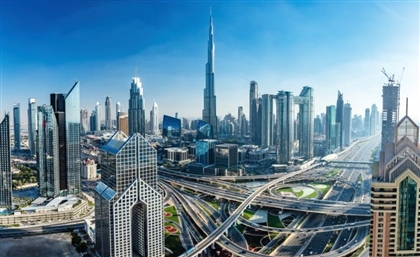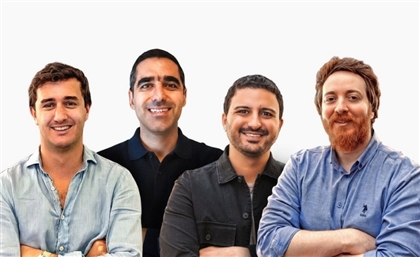How UAE Agritech Graze-it is Disrupting the Food Value Chain in MENA
By supplying companies with “feed as a service”, Graze-it aims to reduce reliance on imported feed stock and cut over 35% of carbon emissions accounted for each litre of milk produced.

The agricultural industry in the Middle East has been facing its biggest changes since the COVID-19 pandemic. From supply chain disruptions to price fluctuations and shortage of agricultural inputs, the region has a serious food security problem, one which Emirati agritech Graze-it is hoping to solve.
Launched in 2021, UAE-based Graze-it aims to reduce reliance on imported feed stock, and eliminate expensive transportation and logistics costs by growing sustainable animal feed directly at the consumer’s site. By doing so, it cuts more than 35% of the overall carbon emissions that can be accounted for each litre of milk produced.
Serial entrepreneur Alexandre Allegue first came up with the idea of Graze-it after realising the environmental impact of the meat and dairy industry, and the region’s reliance on it for food security. “We are all consuming from this industry, but somehow we feel a bit guilty because of the environmental impact it has on the planet,” Alexandre Allegue, CEO and Founder of Graze-it, tells StartupScene. “It is not only about greenhouse gas emissions, but also about food security, especially in our region. The Middle East was and is still importing more than 90% of its animal feed. With the COVID-19 pandemic, transportation costs went through the roof, and with the war in Ukraine, some countries faced major feed shortages.”
Looking for ways to disrupt the value food chain, Allegue decided to provide accessible, economical and sustainable animal feed to dairy companies in the Middle East. Today, the startup is working with Al Safi Danon, one of the biggest dairy brands in Saudi Arabia and the region, and plans to expand further across the GCC in the next two years.
HOW IT WORKS
Unlike conventional feed agriculture, Graze-it grows where its customers are, saving not only on import costs, but also on transportation expenses.
To give an example of just how expensive importing animal feed can be, Allegue states that some dairy companies import $50 million to $70 million worth of feed, and store it in their facilities for as long as six months. By Graze-it being responsible for the complete production of the feed, however, it is able to supply companies with “feed as a service” through its subscription model.
“Instead of the feed sitting idle in your backyard, and instead of depending on the volatility and availability of the feed, and the fluctuation of price, producers can have a subscription agreement where they commit to buying our feed that will be produced on a daily basis, at a specific quantity, quality, and price,” he says. “And with this agreement, we will then build ourselves a special controlled environment for agriculture.”
The animal feed, or fresh fodder, is grown at a hydroponic vertical farming facility that uses a lot of big data and AI technologies to closely monitor the health and nutritional value of the feed. The first facility is now being built in Saudi Arabia, and it is expected to be completed by the end of 2023.
HIGH NUTRITIONAL VALUE
Despite the startup’s innovative approach to locally sourcing animal feed, the road to success was far from easy.
“My background is in the energy space,” Allegue says. “Not only did I decide to jump into a new and unfamiliar space, but I wanted to disrupt it as well. And to do both things at the same time is quite bold, and very risky.”
The main task of developing fresh fodder that is high in nutritional value, while also being cost-effective, was a very complex process. But without it, Allegue would not be able to penetrate the market and sell his product. “This is a business where no matter how much capital you raise, if there is no business case, it cannot work,” he says. “It’s all about the cost of production of your feed and the nutrition value. And if the nutrition value by default is, because of the nature of the crop that you’re using, not as high or doesn’t fulfil the requirement or doesn’t have the right biological reaction in the cow, then you don’t have any value add and you cannot build a business case.”
To develop feed with the highest nutritional value, Allegue had to rely on the knowledge and expertise of nutritionists, which were hard to come by. Describing the industry as ‘opaque’, Allegue had to be resourceful in developing the optimal mix of ingredients to produce animal feed. By continuously testing and improving outputs, he and the team were able to develop a feed that improves animal health, and has up to 25% income over feed cost (IOFC), which is basically the net income after paying feed costs.
GOOD FOR THE ENVIRONMENT
While optimising a farmer’s bottom line is certainly important, having a positive environmental impact is ultimately what is fueling Allegue’s drive to success.
By replacing 30% of the animal feed with Graze-it, farmers can help reduce the high carbon footprint of the meat and dairy industry, which accounts for an estimated 14.5% globally, according to the UN’s Food and Agricultural Organization. “Combining methane reduction, and the transportation and logistics carbon footprint that you would displace by growing on site, all of that has a huge footprint,” says Allegue. “A farm like the one we’re building in Saudi Arabia will allow us to reduce about 200,000 metric tons of emissions per year. To give you an idea, this is more than 35,000 cars that you’re removing from circulation.”
That’s in addition to the startup using 95% less water than conventional agriculture by growing directly at the consumer’s site. “Because we recycle it,” Allegue adds. “Whereas as conventional farming, they irrigate the land, and half of it can be evaporated. We’re very sensitive and optimal when it comes to water consumption.”
With the new facility in Saudi Arabia near completion, Graze-it is gearing to enter the region’s biggest dairy market. It’s also where the startup’s investors are located. Relying on project finance, the startup was able to raise the necessary capital to finance the facility without the need for equity investment.
“Food security, quality security, reduction of inventory, and reduction of environmental impact, those are the main drivers for us,” Allegue says.
Looking to the future, Graze-it aims to expand further across the GCC, and target markets in Latin America and other parts of the world.






















